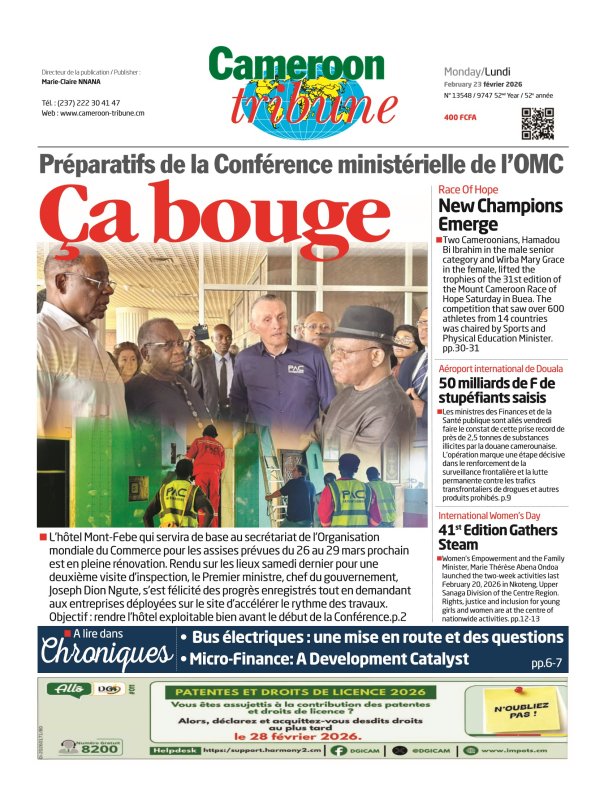Urban Planning: Urgent Need For Development
- Par Eldickson Agbortogo
- 01 Dec 2022 10:52
- 0 Likes
In the past four decades, several governments across the globe especially Cameroon, have been doing all they can to make sure urban towns are safe places to live. They have made urban planning a cardinal issue for urban dwellers, government institutions and professionals. It is no secret that towns in Cameroon suffer from socio-economic and environmental problems and need the putting in place of adequate measures to avoid disorder that results from the inadequate enforcement of its plan, non-respect of building codes, poverty and limited houses with potable water, business conflicts, inadequate health facilities and increasing crime wave.
The expansion of urban areas is a common and historical phenomenon in Cameroon. Nowadays, poorly planned urban expansion has led to several problems. This situation is further compounded by the short-sightedness of some decision-makers to address the preponderant issue adequately. In the case of Cameroon, there are varying actors involved in the process of urban planning. The Ministry of State Property and Land Tenure (MINDCAF) has authority over all land, but many of its objectives are largely focused on state land. The Ministry of Economy, Planning, and Regional Development (MINEPAT) is responsible for the development and implementation of the country’s economic policy and the Ministry of Energy and Water Resources (MINEE) primary responsibility is to develop, implement and evaluate policies concerning water resources and its exploitation. Theoretically, all these institutions are enshrined with good laws and regulations. But the challenge lies in inadequate implementation of these town planning laws. Even the putting in place of a master plan which is a document that lays down the basic guidelines for developing a given urban area has not helped things. The August 1982 master plan, though outdated, is the only document available. It has hardly been implemented and nothing has been done to update and make it a working tool in town planning.s
Because of the prevailing cacophony, there is lack of coordination between the different actors. Every day we read in newspapers, hear from the radio and television how sumptuous occasions have been organized to announce the availability of funds and rapid take-off or execution of projects in the nooks and crannies of the country. But several months and even years after, the projects have not kicked-off, some of the foundation stones are nowhere to be found or covered with grass. At the level of the ministries, documents show that the level of execution of the projects is increasing. By the end of the budgetary year, the final documents indicate that the project has been completed or witnessed an 80 percent execution. These things happen until the Minister in charge becomes vigilant an announce the cancellation of such fake deals for the masks to fall off.
In towns especially those in the urban areas, it is common to see roadsides undergo several mutations within a short space of time. In the morning, digging is done by this or that company or a group of hard-to-be identified individuals laying pipes with the aim of supplying water to the different residential areas. A few days after they complete the process, another company or individuals are seen on the same site, digging the same roadsides with the aim of laying other cables. The same scenario applies to those involved in the supply of electricity to residential areas. The problem here is not the digging of roadsides, but the lack of coordination among the stakeholders and the abandoning of the site after digging. Apart from the roadsides, potholes sprout here and there, making driving extremely difficult for the inhabitants. Because not only vehicle owners run the risk of being involved in accidents, commuters also find it difficult to carry out their daily chores. In some cases, water pipes are destroyed, telephone and electricity cables are damaged, rendering communication virtually impossible. What is funny is that none of the stakeholders take responsibility. While those involved in road construction accuse the energy supply company for being behind their delay to complete certain works, the water supply company attributes the lack of water in homes to the destruction of its...
Cet article complet est réservé aux abonnés
Déjà abonné ? Identifiez-vous >
Accédez en illimité à Cameroon Tribune Digital à partir de 26250 FCFA
Je M'abonne1 minute suffit pour vous abonner à Cameroon Tribune Digital !
- Votre numéro spécial cameroon-tribune en version numérique
- Des encarts
- Des appels d'offres exclusives
- D'avant-première (accès 24h avant la publication)
- Des éditions consultables sur tous supports (smartphone, tablettes, PC)











Commentaires